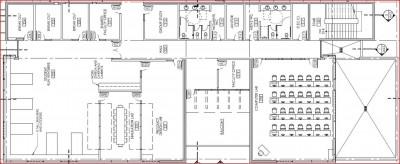CEED program students won’t be sitting all day
Eric Spieth is disrupting the classroom.
His new space in the Redmond Technology Center isn’t what you might expect from a business course. It has a simulation conference room, rooms for collaboration and focus groups, mobile furniture and equipment, and one room whose walls are all whiteboards.
Why? Because Spieth believes in more than traditional entrepreneurship. He believes in “do-preneurship.”
The Central Oregon Community College business professor coined this term when he was hired in 2011 as the team lead to develop a curriculum for the college’s Center for Entrepreneurial Excellence Development.
“This program will not only teach students the fundamentals of entrepreneurship … It will have a hands on, sky’s-the-limit dynamic,” Spieth said. “They won’t just be sitting in a classroom listening.”
CEED will open in September with programs aimed to support entrepreneurs and small business startups. The CEED program will be housed in the new Redmond Technology Center starting fall 2014. Eric Spieth believes the program will educate students beyond conventional entrepreneurship, and architects worked closely with the COCC business department to create a workspace in the Redmond Technology Center that would support this idea.
The 20-week program “disrupts the education process in a good way,” according to Spieth. The program takes students from idea to complete business model.
Students interested in the program don’t need to have a background in business or be enrolled in the business program. The program is open to all students from all backgrounds.
Spieth created the program from scratch and did beta testing beforehand. The first program was three terms and felt too long, but the second one lasted for 15 weeks and students felt it was too short.
“The students needed a culminating experience and finality on the project,” Spieth said. “Thus the two term model.”
The program will start out with a small student group — no more than 28. This allows faculty to work closely with student groups and act as advisors.
The Small Business Development Center will also be expanding to the Redmond Technology Center. This will help to create an overall collaborative environment for students by combining resources for business development, according to Steve Curley, director of the Small Business Development Center.
“Being co-located in the same building gives more opportunities for resources to be utilized effectively,” Curley said.
Another advantage to being located in the Redmond Technology Center will be for those seeking to create product based businesses. The Redmond Technology Center will house many manufacturing and other technology programs so students will have access to 3-D printers, welding equipment and other resources to design products.
“Students wanting to create a more product-based business can benefit for those from the workshops and resources,” Spieth said.
In the past, Spieth has seen students launch “goods, services and experience based businesses” and believes the best businesses combine all three.
Spieth has seen students come through his program and turn their projects into a reality in the community. This hands-on teaching is what leads to success long term for small businesses.
“Students should start exploring their passions and think about what they want to do for the rest of their lives,” Spieth said. “Even if students are just exploring it helps them to see the world in a different way.” “This program will be a great place for students to discover and be innovative and creative.”
Molly Svendsen | The Broadside
(Contact: [email protected])














